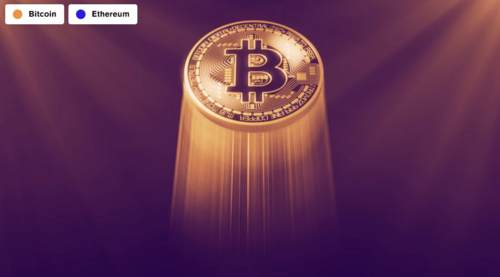
By Jeff Benson

The era of easy money may soon be coming to an end in the U.S. And markets are excited.
The Federal Reserve indicated today it would start phasing out its pandemic stimulus program—in which it bought bonds to increase the monetary supply—quicker than it had planned. The Fed also said it plans to raise interest rates, which now hover near 0%, at least three times in 2022.
The moves are aimed at easing inflation that's running well past the central bank's long-term 2% target. But they also are having an effect in the short run, as stock prices rise.
Crypto prices also popped on the news. Bitcoin travelled from below $47,000 to nearly $49,500 in the span of a few hours, while Ethereum ascended from below $3,700 early Wednesday to back above $4,000. While the excitement has faded in the hours since the announcement, BTC and ETH are still in the green over the last 24 hours, as the total crypto market cap increased by more than 4%.
Equities and crypto markets had been hanging on the edge of their seats this week, waiting for the Fed's decision on whether to increase interest rates to combat rising inflation. The consumer price index, the most common measure of inflation, rose by 6.8% in November. That means goods and services such as groceries, gas, and electricity have increased by nearly 7% in just one year—the highest rate since 1982.
Some of that is to be expected. The coronavirus pandemic put a chill on consumer activity in early 2020 that the federal government then compensated for with stimulus checks and bond-buying. There's just more money floating around.
By raising interest rates, the Fed makes it more expensive for financial institutions to borrow money, which is ultimately passed on to consumers in the form of higher credit card rates and home loans. Americans will thus have less available to spend, theoretically cooling off the economy and bringing down inflation.
Fed bond purchases add to the effect. Last month, the central bank cut bond purchases by $15 billion a month. After today's meeting, the current $90 billion in bond purchases will decrease by $30 billion a month.
All of this both does and doesn't have an effect on Bitcoin and cryptocurrencies. While Bitcoin OGs see inflation as an "advertisement" for the deflationary asset (only 21 million coins will ever be minted), the crypto asset has been increasingly moving in tandem with stock markets as more institutional investors get on board.
And while you might think that stocks would be down on the prospects of a "cooling" economy, far from it. The S&P 500 gained 1.6% and the Nasdaq surged 2.2% after enduring two straight days of losses.
